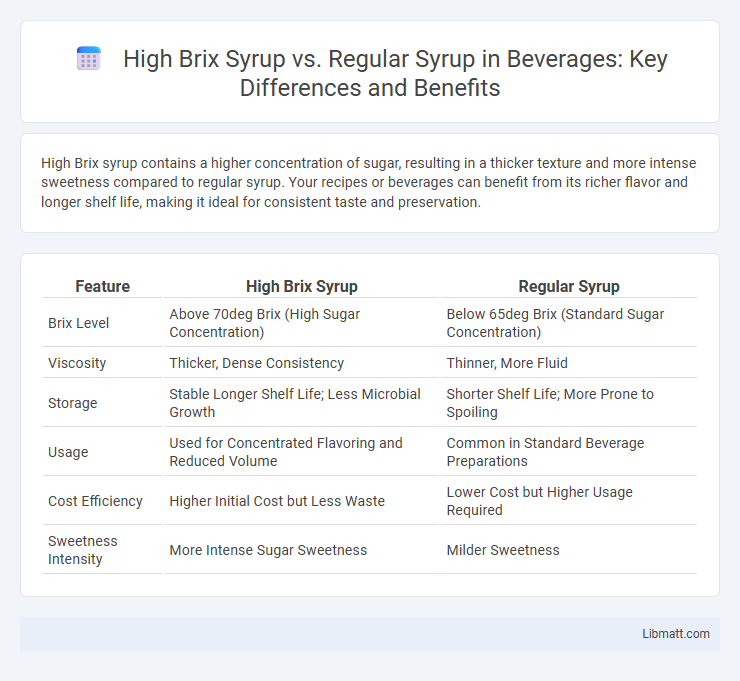High Brix syrup contains a higher concentration of sugar, resulting in a thicker texture and more intense sweetness compared to regular syrup. Your recipes or beverages can benefit from its richer flavor and longer shelf life, making it ideal for consistent taste and preservation.
Table of Comparison
| Feature | High Brix Syrup | Regular Syrup |
|---|---|---|
| Brix Level | Above 70deg Brix (High Sugar Concentration) | Below 65deg Brix (Standard Sugar Concentration) |
| Viscosity | Thicker, Dense Consistency | Thinner, More Fluid |
| Storage | Stable Longer Shelf Life; Less Microbial Growth | Shorter Shelf Life; More Prone to Spoiling |
| Usage | Used for Concentrated Flavoring and Reduced Volume | Common in Standard Beverage Preparations |
| Cost Efficiency | Higher Initial Cost but Less Waste | Lower Cost but Higher Usage Required |
| Sweetness Intensity | More Intense Sugar Sweetness | Milder Sweetness |
Understanding High Brix Syrup
High Brix syrup contains a higher concentration of soluble solids, typically above 70%, compared to regular syrup, which ranges between 60-65% Brix, resulting in a thicker, more concentrated product. This elevated Brix level enhances sweetness intensity, reduces water activity, and improves shelf life, making High Brix syrup ideal for confectionery, beverages, and industrial food processing. Understanding the precise Brix value helps manufacturers optimize texture, flavor, and preservation in their formulations.
What Is Regular Syrup?
Regular syrup is a sweet, viscous liquid typically made from refined sugar and water, used widely as a sweetener in beverages and food products. It has a lower Brix value, usually around 42, indicating its moderate sugar concentration compared to high Brix syrup. Understanding the difference helps you choose the right syrup for your culinary or beverage needs based on sweetness intensity and sugar content.
Key Differences Between High Brix and Regular Syrup
High Brix syrup contains a higher concentration of dissolved sugars, typically above 70% Brix, resulting in a thicker consistency and sweeter taste compared to regular syrup, which usually ranges between 50-65% Brix. This higher sugar content in High Brix syrup provides better preservation qualities, extended shelf life, and improved solubility in cold beverages. In contrast, regular syrup's lower sugar concentration offers a lighter texture and faster dissolving rate, making it suitable for applications requiring a milder sweetness and quicker mixing.
Production Process of High Brix Syrup
High Brix syrup is produced by concentrating sugar content to a higher level, typically above 70 degrees Brix, through controlled evaporation and refining processes. Unlike regular syrup, which usually has a Brix level around 60, high Brix syrup undergoes additional filtration and heating to achieve a denser, more viscous consistency and enhanced sweetness. This production process results in increased stability and a longer shelf life, making high Brix syrup ideal for industrial applications and specialized food manufacturing.
Nutritional Profile Comparison
High Brix syrup contains a higher concentration of dissolved solids, resulting in greater sweetness and a more concentrated flavor compared to regular syrup. Its elevated sugar content typically means increased caloric density and a reduced water content, which can affect the glycemic index and nutrient absorption. Regular syrup has a lower Brix value, making it less sweet and more diluted, with slightly fewer calories per serving but potentially higher moisture levels.
Sweetness and Flavor Intensity
High Brix syrup contains a higher sugar concentration, which results in greater sweetness and a more intense flavor compared to regular syrup. This concentrated sweetness enhances your recipes by providing deeper, richer taste profiles without needing to use large quantities. Choosing High Brix syrup can elevate the flavor intensity in beverages and desserts while maintaining consistent sweetness levels.
Applications in Food and Beverage Industry
High Brix syrup, characterized by a higher concentration of dissolved solids, offers enhanced sweetness and viscosity compared to regular syrup, making it ideal for beverage formulations requiring intense flavor and thicker consistency such as craft sodas and specialty coffees. Its concentrated nature reduces the amount of syrup needed, improving cost efficiency while maintaining product stability in sauces, dressings, and baked goods. Your formulations benefit from improved shelf life and uniform sweetness, essential for consistent quality across diverse food and beverage applications.
Shelf Life and Storage Considerations
High Brix syrup, with its higher sugar concentration typically above 70%, significantly extends shelf life by inhibiting microbial growth more effectively than regular syrup with lower sugar content. Your storage conditions should include cool, dry environments and airtight containers to maintain quality and prevent crystallization or fermentation in both types. Proper handling of High Brix syrup ensures longer usability without preservatives, making it a preferred choice for extended storage needs.
Health Implications: Which Is Better?
High Brix syrup contains a higher concentration of sugar solids, resulting in a thicker consistency and more intense sweetness compared to regular syrup. This elevated sugar content can lead to increased calorie intake and a higher glycemic index, potentially raising the risk of insulin resistance and metabolic disorders. For individuals seeking healthier options, regular syrup with a lower Brix value may be preferable due to its reduced sugar density and slower impact on blood sugar levels.
Choosing the Right Syrup for Your Needs
High Brix syrup contains a higher concentration of dissolved solids, resulting in a thicker texture and more intense sweetness compared to regular syrup with lower Brix levels. This makes high Brix syrup ideal for recipes requiring a richer flavor and better moisture retention, while regular syrup suits applications where a lighter, less viscous sweetener is preferred. Understanding your culinary or beverage needs helps you select the right syrup to optimize taste, texture, and performance.
High Brix syrup vs regular syrup Infographic

 libmatt.com
libmatt.com